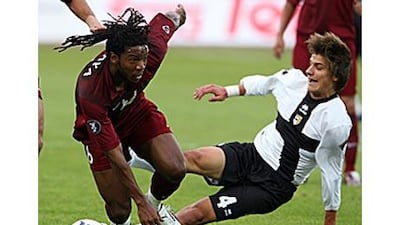When MacBeth Sibaya left Rosenberg for Rubin Kazan in 2003, it seemed a distinct step backwards. They were, after all, a second-flight club, and the idea that they could, seven years later, be Russian champions preparing for a season in the Champions League would have been so preposterous as to be unthinkable. Yet tonight, the South African will line up for Rubin away to Dinamo Kiev in their first Champions League fixture, with even more glamorous games against Inter Milan and Barcelona to come. For player and club, this has been a remarkable journey.
Sibaya, a diligent if unspectacular midfielder, had played in the Champions League for the perennial Norwegian champions, and a footballing backwater 450 miles east of Moscow can have held little appeal, not that he will admit as much. Or at least not directly; he does, though, give the impression that the city had to grow on him. "I've been there seven years so everything is OK," he said. "I'm used to the place. Kazan is a great city, not too big, has a small population [a little over a million] and I like it very much there. I love it and the people love me over there."
As they should, for while the city has grown on him, so its football team, Rubin, has grown around him. Kazan styles itself as the "third capital of Russia" and, having probably been founded, at least in its modern form, by Tartars of the Golden Horde in the 15th century, is the capital of Tartarstan. It is indisputably a major city, noted for its sixteenth-century Kremlin, which is a world heritage site, but until recently football had not been of much concern. Rubin never played in the Soviet Supreme League, and as recently as 1997 they were in the central division of the Russian third flight.
The local administration, though, invested heavily, encouraged by the central government's policy of reaching out to the regions, particularly those with significant Muslim populations. Rubin is, along with Terek Grozny, one of two sides in the Russian Premier League with predominantly Islamic backing. That may not mean much to Sibaya, but the enormous mosque that towers over one side of the stadium is a constant reminder, while Rubin's coach, Kurban Berdyev, can often be seen fiddling with his prayer beads on the touchline.
"It's just something I need," Berdyev explained. "I just feel that I have to keep them in my hands when I'm watching a game. I don't feel well without them. There were a couple of times when I accidentally forgot to take them to matches and I felt uncomfortable as though I were missing something." This is his ninth season at Rubin, and he has been central to their rise, wheeling and dealing astutely - as he has had to, for even with Tartarstan government backing, Rubin's budget is dwarfed by the likes of Zenit St Petersburg and CSKA Moscow.
"He took them from the first division to where they are now," said Sibaya. "We've been seven years in the Premier Division, and he's done very well. We took bronze that first season [2003] and the fourth season we were fifth. We've done great. It was a good achievement last season to win the Russian league. He's not really a motivator; he's more a dictator. You have to do what he's telling you, otherwise you're sitting on the bench. He's very strict?. He monitors everything."
That may not be an entirely popular policy, but few would dare to challenge Berdyev after his recent success. Last season Rubin won their first seven games of the season - a record - and although they stuttered with six draws in a row either side of Euro 2008, a 4-1 rout of Zenit set them on their way again. "It was a little bit of a surprise to win the title," Sibaya admitted, "but we started well, won our first seven games and after that everybody started to be more comfortable and more confident."
The influence of Berdyev was clear. Alongside Sibaya at the back of the midfield was Sergei Semak, a 32 year old he had picked up on a free transfer from FK Moskva. Most thought his career was winding down, but he was so influential in the early part of last season that he was recalled to the national team and ended up captaining Russia at the Euros. Sergei Rebrov and Savo Milosevic also enjoyed Indian summers in Kazan.
Now it is Sibaya who, at 31, is approaching the autumn of his career. He too has benefited from Berdyev's coaching, maturing into a midfielder who, although rarely eye-catching, equally rarely loses possession, and has a happy gift for being in the right place to thwart opposition attacks. For him, the next year could be a spectacular finale, with the Champions League being followed next summer by the World Cup back home in South Africa.
"For me it's the cherry on top of my career," he said. "Winning the title after seven years and then having another chance to play in the Champions League. "I had the chance with Rosenberg. It was a great experience, a totally different level, a different class. You feel you're something special when you play in that competition." For the crowd in Kazan it will be special too. "People have been going crazy for months," Sibaya said. "They were asking about tickets long before they went on sale and long before the draw had been made. People are calling the club all the time asking about tickets.
"They're really ready for these games. And playing Barcelona, the European champions, will be a great experience, and it will be great for the people of Kazan." sports@thenational.ae Dinamo Kiev v Kazan, KO 10.45pm, Aljazeera Sport +8

